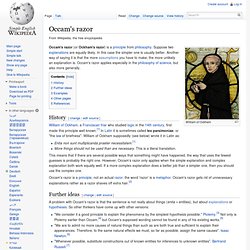

Tetrapharmakos. The Tetrapharmakos (τετραφάρμακος) "four-part remedy" is a summary of the first four of the Κύριαι Δόξαι (Kuriai Doxai, the forty Epicurean Principal Doctrines given by Diogenes Laërtius in his Life of Epicurus) in Epicureanism, a recipe for leading the happiest possible life.

They are recommendations to avoid anxiety or existential dread.[1] The four-part cure[edit] As expressed by Philodemos, and preserved in a Herculaneum Papyrus (1005, 4.9–14), the tetrapharmakos reads:[4] This is a summary of the first four of the forty Epicurean Principal Doctrines (Sovran Maxims) given by Diogenes Laërtius, which in the translation by Robert Drew Hicks (1925) read as follows: 1. 2. 3. 4.
Don't fear god[edit] In Hellenistic religion, the gods were conceived as hypothetical beings in a perpetual state of bliss, indestructible entities that are completely invulnerable. Don't worry about death[edit] As D. What is good is easy to get[edit] What is terrible is easy to endure[edit] References and notes[edit] Book - 9 insights on&life - StumbleUpon. Transhuman Cosmic Conscious Evolution... Transhumanism (>H or H+) is the belief that we can, and should, try to overcome our biological limitations by means of reason, science, and technology.

Transhumanists seek things like intelligence augmentation, increased strength and beauty, extreme life extension, sustainable mood enhancement, and the capability to get off-planet and explore the universe. These goals are to be achieved with the aid of contemporary and future technologies such as genetic engineering, nanotechnology, cryonics, megascale and space-time engineering, AI, and mind uploading. In other words, (hardcore) Transhumanists seek to become posthuman (demi-)gods -- "persons of unprecedented physical, intellectual, and psychological capacity. Self-programming, self-constituting, potentially immortal, unlimited individuals. " Introductions to Transhumanism • What is Transhumanism? • Transhumanism: The Next Step? • Transhumanism and Extropianism, by Greg Burch • The Transhumanist FAQ. List of unsolved problems in philosophy - Wikipedia, the free encyclopedia - StumbleUpon.
This is a list of some of the major unsolved problems in philosophy.

Clearly, unsolved philosophical problems exist in the lay sense (e.g. "What is the meaning of life? ", "Where did we come from? ", "What is reality? ", etc.). Aesthetics[edit] Essentialism[edit] In art, essentialism is the idea that each medium has its own particular strengths and weaknesses, contingent on its mode of communication.
Art objects[edit] This problem originally arose from the practice rather than theory of art. While it is easy to dismiss these assertions, further investigation[who?] Epistemology[edit] The free encyclopedia. Logic and perception - topical index -The Skeptics Dictionary - Skepdic.com. Logical Paradoxes - StumbleUpon. Occam's razor. William of Ockham Occam's razor (or Ockham's razor) is a principle from philosophy.

Suppose two explanations are equally likely. In this case the simpler one is usually better. Another way of saying it is that the more assumptions you have to make, the more unlikely an explanation is. Occam's razor applies especially in the philosophy of science, but also more generally. History[change | edit source] William of Ockham, a Franciscan friar who studied logic in the 14th century, first made this principle well known.[1] In Latin it is sometimes called lex parsimoniae, or "the law of briefness".
Entia non sunt multiplicanda praeter necessitatem.[1]More things should not be used than are necessary. This means that if there are several possible ways that something might have happened, the way that uses the fewest guesses is probably the right one. Occam's razor is a principle, not an actual razor: the word 'razor' is a metaphor. Further ideas[change | edit source] Examples[change | edit source] Philosophy since the Enlightenment, by Roger Jones.